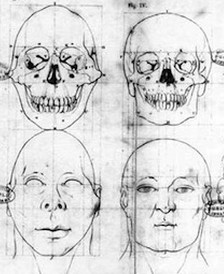Kenan Malik in Pandaemonium:
 In an essay this week in New York Times, the philosopher Justin Smith tells the story of Anton Wilhelm Amo, a West African student and former slave who defended a philosophy dissertation at the University of Halle in Saxony, written in Latin and entitled On the Impassivity of the Human Mind. A dedicatory letter was attached to the dissertation from the rector of the University of Wittenberg, Johannes Gottfried Kraus, who, Smith observes, ‘praised the “natural genius” of Africa, its “appreciation for learning”, and its “inestimable contribution to the knowledge of human affairs” and of “divine things”. Kraus placed Amo in a lineage that includes many North African Latin authors of antiquity, such as Terence, Tertullian and St. Augustine.’
In an essay this week in New York Times, the philosopher Justin Smith tells the story of Anton Wilhelm Amo, a West African student and former slave who defended a philosophy dissertation at the University of Halle in Saxony, written in Latin and entitled On the Impassivity of the Human Mind. A dedicatory letter was attached to the dissertation from the rector of the University of Wittenberg, Johannes Gottfried Kraus, who, Smith observes, ‘praised the “natural genius” of Africa, its “appreciation for learning”, and its “inestimable contribution to the knowledge of human affairs” and of “divine things”. Kraus placed Amo in a lineage that includes many North African Latin authors of antiquity, such as Terence, Tertullian and St. Augustine.’
Smith contrasts Kraus’ attitude with that of the Scottish philosopher David Hume who in 1742 would write:
I am apt to suspect the Negroes, and in general all other species of men to be naturally inferior to the whites. There never was any civilized nation of any other complection than white, nor even any individual eminent in action or speculation.
Hume’s attitude expresses what Smith calls ‘the Enlightenment’s race problem’:
Scholars have been aware for a long time of the curious paradox of Enlightenment thought, that the supposedly universal aspiration to liberty, equality and fraternity in fact only operated within a very circumscribed universe. Equality was only ever conceived as equality among people presumed in advance to be equal, and if some person or group fell by definition outside of the circle of equality, then it was no failure to live up to this political ideal to treat them as unequal.
It would, Smith suggests, ‘take explicitly counter-Enlightenment thinkers in the 18th century, such as Johann Gottfried Herder, to formulate anti-racist views of human diversity.’ The question we need to ask ourselves today, Smith insists
is why we have chosen to stick with categories inherited from the 18th century, the century of the so-called Enlightenment, which witnessed the development of the slave trade into the very foundation of the global economy, and at the same time saw racial classifications congeal into pseudo-biological kinds, piggy-backing on the divisions folk science had always made across the natural world of plants and animals. Why, that is, have we chosen to go with Hume and Kant, rather than with the pre-racial conception of humanity espoused by Kraus, or the anti-racial picture that Herder offered in opposition to his contemporaries?
This has become a common argument in recent years: that the modern roots of the idea of race lie in the Enlightenment.
More here.
